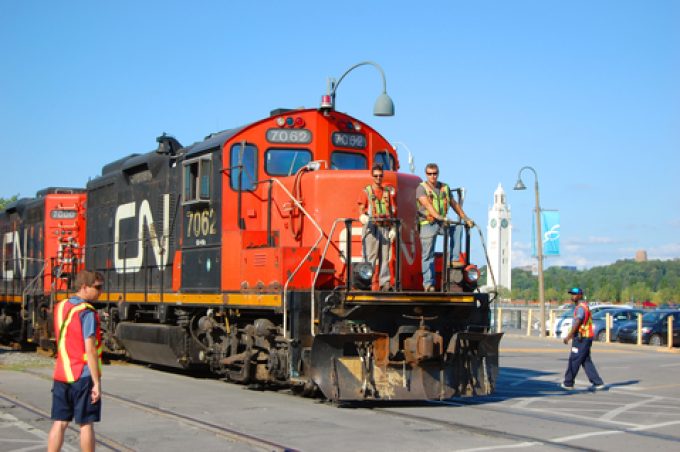Canadian Pacific Kansas City and Americold eye joint expansion in Mexico
Class I railway Canadian Pacific Kansas City and cold chain facility provider Americold are looking ...
FDX: ABOUT USPS PRIVATISATIONFDX: CCO VIEWFDX: LOWER GUIDANCE FDX: DISRUPTING AIR FREIGHTFDX: FOCUS ON KEY VERTICALFDX: LTL OUTLOOKGXO: NEW LOW LINE: NEW LOW FDX: INDUSTRIAL WOESFDX: HEALTH CHECKFDX: TRADING UPDATEWMT: GREEN WOESFDX: FREIGHT BREAK-UPFDX: WAITING FOR THE SPINHON: BREAK-UP ALLUREDSV: BREACHING SUPPORTVW: BOLT-ON DEALAMZN: TOP PICK
FDX: ABOUT USPS PRIVATISATIONFDX: CCO VIEWFDX: LOWER GUIDANCE FDX: DISRUPTING AIR FREIGHTFDX: FOCUS ON KEY VERTICALFDX: LTL OUTLOOKGXO: NEW LOW LINE: NEW LOW FDX: INDUSTRIAL WOESFDX: HEALTH CHECKFDX: TRADING UPDATEWMT: GREEN WOESFDX: FREIGHT BREAK-UPFDX: WAITING FOR THE SPINHON: BREAK-UP ALLUREDSV: BREACHING SUPPORTVW: BOLT-ON DEALAMZN: TOP PICK

Rail operators Canadian National (CN) and Canadian Pacific Kansas City (CPCK) formally locked out employees represented by the Teamsters Canada Rail Conference (TCRC) a minute after midnight.
“Without an agreement or binding arbitration, CN had no choice but to finalise a safe and orderly shutdown and proceed with a lockout,” it explained.
Ocean carrier Hapag-Lloyd said Canadian rail ramps and marine terminals would remain open for pick-up of import containers, but warned that boxes not collected within the non-chargeable ‘free’ time would thereafter be subject to demurrage fees.
Empty returns are still being accepted and containers not returned within the free time will be subject to detention fees.
According to Everstream Analytics, the number of vessels arriving at container terminals in the port of Vancouver dropped from 73 to 61 in the second week of August – the second-lowest number of arrivals this year.
Around 66% of cargo arriving at the port is moved by rail to final destinations in Canada or in the US Midwest.
“We expect more containerships will divert to alternative ports, including Los Angeles/Long Beach, Oakland and Seattle, in the coming days as yard congestion at Canadian ports and rail dwell times increase significantly,” predicted Everstream’s global director of intelligence, Mirko Woitzik.
Meanwhile, CPKC warned of “further uncertainty and widespread disruption… should the dispute drag out further, resulting in a potential work stoppage during the fall peak shipping period”.
Yesterday, Canada’s minister of labour, Steven MacKinnon, met separately with the parties and encouraged them to reach a deal, but there were no advancements.
CPKC said it was clear a negotiated outcome with the TCRC was “not within reach”, and added that the union had made “unrealistic demands that would fundamentally impair the railway’s ability to serve customers with a reliable and cost-competitive transportation service”.
CN added: “The Teamsters have not shown any urgency or desire to reach a deal that is good for employees, the company and the economy.”
TCRC told its members: “All three committees remain at the table with the help of federal mediators, willing and ready to engage with the carriers. Unfortunately, CN and CPKC continue to demonstrate their unwillingness to respect affected TCRC members.
“Your bargaining committee is determined to see this fight to the end, with the goal of achieving a fair and equitable agreement.”
Both rail operators are pushing for all parties to enter binding arbitration, where a neutral third party hears both sides of the dispute, reviews relevant evidence and makes a final and binding decision. But the union has refused.
And, according to the American Association of Port Authorities, Canadian finance minister Chrystia Freeland said the government expected Canada’s two main railway companies and their union to “do their jobs”, and reach agreement on their own.
The association added: “Canada’s parliament, which isn’t scheduled to convene again for several weeks, is also unlikely to force arbitration, through ‘back to work’ legislation… Prime minster Justin Trudeau also encouraged rail companies and their union to reach a deal on their own.”
Frank Kenney, director of industry solutions at integration company Cleo, told The Loadstar that while Canada’s trucking networks could step in to fill the gap, the concentration of key resources and limited alternatives meant “companies need to be more proactive than ever”.
“Diversifying transportation modes, decentralising inventory and investing in stronger supplier relationships are no longer optional; they’re essential for survival in this unpredictable landscape,” he added.
Comment on this article